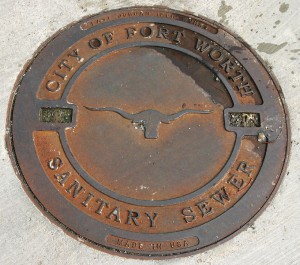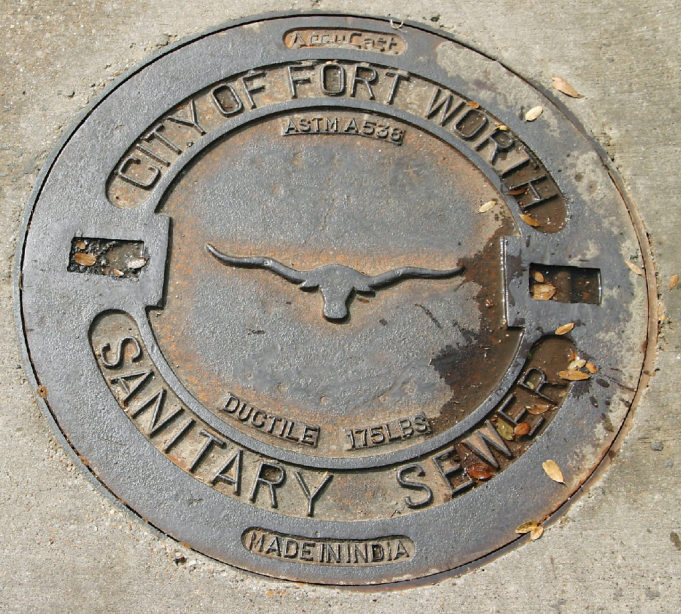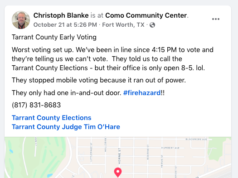The manner in which we normally read the Fort Worth Star-Telegram’s “Cheers & Jeers” section probably says a lot about our psychological makeup. What do you bet most people focus on the Jeers? And why not? The Cheers read like typical Facebook posts (“Cheers to Coach Clem McGillicuty for winning the coach of the year award!”) and Yelp reviews (“Cheers to Bustabone Clinic for the wonderful treatment I received after breaking my pinky.”). The Cheers always outnumber the Jeers. Static prefers the Jeers, even though most people around these parts are too darned nice to pen a deliciously poisonous note. This one from the Feb. 26 edition falls into that nice category but still caught our attention: “Jeers to the city of Fort Worth for the manhole covers that read ‘Made in India.’ Why not ‘Made in USA?’ ”
Yeah, why is City Manager David Cooke forcing all of this city’s foundry workers to stand in bread lines while people in India are making it rain at strip joints all across that country with their hefty manhole cover profits? So we delved deep into Al Gore’s invention, typing in crucial keywords and clicking “Enter” numerous times, and we learned that many U.S. cities, including our most notable one –– New York City –– rely on manhole covers made in India. Cities tend to accept the lowest bids, and few manhole cover makers can compete with those in South Asia. The New York Times and other newspapers have written about the dismal working conditions and low pay found at many foreign foundries.

Fort Worth officials switched from Made in USA manhole covers to the Indian version in 2001, cutting the city’s costs by about a third in the years since. “The cost of imports was 37 percent lower in a 2013 bid process,” said city spokesman Kevin Neal.
Fort Worth’s early, USA-made manholes look pretty cool, but the newer ones look cool, too. The new ones feature “Fort Worth” in raised letters and are adorned with a longhorn steer and “Made in India.” Manhole covers are kind of like works of art. Very heavy works of art. But not heavy enough, apparently. Several years ago, we saw an early, ornate version of a Fort Worth utility cover listed on eBay for $100. We e-mailed eBay and the seller to complain about auctioning off stolen property, but we can’t recall if the listing was removed.
Manhole cover thefts were more commonplace in the past. The circular objects are made of cast iron, which can be traded in for cash at metal recycling plants.
“In the past we experienced a lot of thefts of those and water grates around the city,” said Fort Worth police officer D.A. Hawkins, who monitors metal recyclers. “We have strengthened our laws and ordinances since then, and we have not seen the thefts we once had.”
Sellers must reveal themselves when selling certain metal items these days, he said.
“Manhole covers are an item that is listed as a regulated metal to where if brought in to sell, the seller will have to provide a valid ID, [vehicle info], and a letterhead from the company authorizing the seller to sell the item,” Hawkins said. “If they do not have all of these, they cannot sell. Since this item is a regulated metal, if stolen, it is a felony to sell them.”
Local recycling plants are instructed to call Hawkins when someone is trying to sell obviously stolen items. Jeers to anyone who steals manhole covers, utility covers, copper, and other metals to sell. We’re so tired of falling down manholes. To say nothing of all of the gators we’ve got to wrestle.
Milking Rosey Ridge
Warren Norred is no stranger to peculiar and controversial court cases. In 2014, the Arlington lawyer defended Open Carry Tarrant County when the Arlington City Council passed an ordinance to restrict the gun rights group’s ability to hand out pamphlets to motorists. Last year, U.S. Federal Court upheld the city ordinance, which Norred tried to argue infringed on Open Carry’s First Amendment rights.
That same year, Norred started a petition to compel the Texas A&M University School of Law to reissue Texas Wesleyan Law alumni diplomas after A&M purchased the East Fort Worth law school. In what was largely seen as a compromise, A&M issued former Wesleyan law alumni “resolution certificates” that acknowledge A&M’s purchase of Texas Wesleyan Law and encouraged Wesleyan alumni to frame and hang the certificates next to their law degrees.
Norred’s most recent case seeks to overturn a municipal court conviction in Fort Worth. In December, Hill County farmer and Rosey Ridge Farm proprietor Eldon Hooley was fined $1,567 for operating an “illegal food establishment” in Fort Worth. City health department officials and Hooley agree on one thing — the mild-mannered dairy farmer never personally delivered his product, un-pasteurized (raw) milk, to his clients. But some of his customers made deliveries without having a license to operate a food establishment. The gavel fell on Hooley.
“We are appealing the conviction,” Norred said.
The term “food establishment” is unconstitutionally vague, he said.
“A FedEx employee delivering a honey ham could be said to be operating a food establishment,” Norred said. “Of course, they don’t enforce that example, but [a city official] was irritated by Mr. Hooley and decided a van was a food establishment.”
Hooley, a married father of six who lives off the fruits of his land, isn’t deep pocketed. Norred and his staff mulled over the implications of Hooley’s plight before designating the case as a “societally important case.”
The designation allows Hooley’s family to hire Norred at a reduced cost, but there are still expenses that his legal counsel can’t write off. Obtaining a professionally transcribed record of the December case alone will cost $2,000, Norred said. Hooley and Norred have started a crowd-funding campaign (gofundme.com/roseyridgefarm) with the goal of raising $10,000 to cover part of the expenses of the pending trial, more narrowly define the city’s health department ordinance on food establishments, and found a nonprofit to protect farmers like Hooley from “undue interference,” Norred said, by regulators in the future.
“It’s a very unusual case,” Norred said. “You kind of wonder, ‘Doesn’t the city have other things to do that are more pressing than convicting a farmer for doing his job?’ The answer, as I am finding out, is apparently the city doesn’t think it has anything better to do.”
City health department supervisor Elmer DePaula told a Weekly reporter during the December trial that there has been a lot of “public misunderstanding” about the case.
“This case was about food safety,” he said. “Fort Worth is not trying to get in anybody’s refrigerator. The intent is to follow state policy and keep our food safe.”
The appeal trial could start as early as April.
Roundin’ Up Rattlers
Depending on who you talk to, this weekend’s Rattlesnake Roundup in Sweetwater is either a display of barbaric cruelty or the darned-tootin’-est, best-est snake-killin’ time ever! As part of the annual event –– it started in 1958 –– thousand of rattlers will get picked up, milked for their venom, skinned, fried, and then eaten by dozens of everyday yokels and maybe the occasional boatload of European or Japanese tourists. The largest event of its kind on the planet, the roundup will include a carnival, flea market, a gun and knife show, concessions, and dancing. And perhaps an animal rights activist or two. Or 20.
For years, People for the Ethical Treatment of Animals has been calling for an end to the roundup, and Advocates for Snake Preservation say there is “no science to support rattlesnake overpopulation” and that the Eastern Diamondback has been decimated to the point that it is being considered for inclusion in the Endangered Species Act.
The event was started by Sweetwater’s Junior Chamber of Commerce. At the time, ranchers were having a serious issue with rattlers — Sweetwater is in the heart of the Eastern Diamondback’s habitat. The snakes were killing off cattle and occasional ranch hands at a fairly alarming pace. That may no longer be the case. The rodent population in the Sweetwater area has grown dramatically, according to a couple of scientists who study those sorts of things, but that’s not going to interfere with the town’s yearly shot at big money. And with 30,000 folks expected to descend on Sweetwater (pop: 11,000) for the weekend, there are a lot of bucks at stake.













